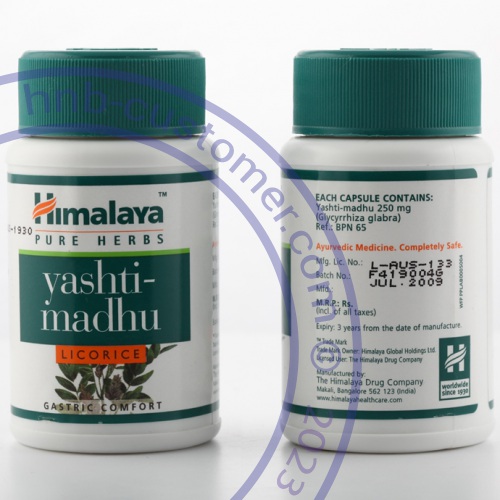Yashtimadhu
Yashtimadhu
Yashtimadhu bottle
What is this herbal medicine?
YASHTIMADHU (Licorice/Glycyrrhiza glabra) has been used for sweetening candies for generations. It is also one of the world's most widely researched herbs for its role in supporting the body’s normal digestive function. Researchers at the Department of Experimental Pharmacology, the University of Naples, Italy, name Yashtimadhu as a digestive herb that ‘has been used extensively and had its clinical efficacy documented.’ They also suggest the use of Yashtimadhu as a dietary adjunct to existing therapies (Phytotherapy Research, December 2000, 14(8):581-91). Scientists at the Laboratory of Natural Medicinal Materials, Tokyo, Japan, point out that Yashtimadhu features in Ancient Greek, Roman, Egyptian and Chinese systems of medicine as one of their most frequently used plants. In Japan, the oldest specimen of Yashtimadhu, brought from China in the 8th century, still exists in the Imperial Storehouse in Shosoin (Yakugaku Zasshi. October 2000, 120(10):849-62). Yashtimadhu grows in the subtropical and warm temperate regions of the world, chiefly in the Mediterranean and China.
Active constituents
The principal constituent of Yashtimadhu and the component that gives Yashtimadhu its characteristically sweet taste, is called glycyrrhizin (also known as glycyrrhizic acid and glycyrrhizinic acid), a saponin glycoside that is 50 times as sweet as sucrose. Its flavonoid constituents include liquiritigenin and isoliquiritigenin. Glycyrrhizin is a gastroprotective and increases the rate of mucus secretion by the gastric mucosa. Glycyrrhizin is also responsible for the demulcent, expectorant and antitussive properties of Yashtimadhu and is beneficial in reducing inflammation in the body.
Herb functions:
- Anti-ulcer: Yashtimadhu is beneficial in treating acid peptic disease. Scientific studies have shown that its extract reduces gastric acid secretion and inhibits the formation of peptic ulcers. Yashtimadhu treats ulcers by accelerating mucin excretion by increasing the synthesis of glycoprotein at the gastric mucosa, prolonging the life of the epithelial cells and antipepsin activity. It is also beneficial in the management of aphthous ulcers or mouth sores.
- Anti-arthritic: Yashtimadhu has been used in traditional systems of medicine to treat rheumatism and arthritis because of its anti-inflammatory activity.
- Anti-allergic: The anti-allergic properties of Yashtimadhu have been attributed to the corticosteroid-like activity of glycyrrhizin and glycyrrhetic acid, also known as enoxolone.
Indications:
- Hyperacidity
- Peptic ulcer
- Arthiritis
- Gastroesophageal reflux disease
Contraindications:
None
Recommended dose:
One capsule, twice a day or as directed by your physician
Composition
Each capsule contains 250mg extract of Yashtimadhu
Note: The information on this page is not intended to be a substitute for professional medical advice. Do not use this information to diagnose or treat your problem without consulting your doctor.













